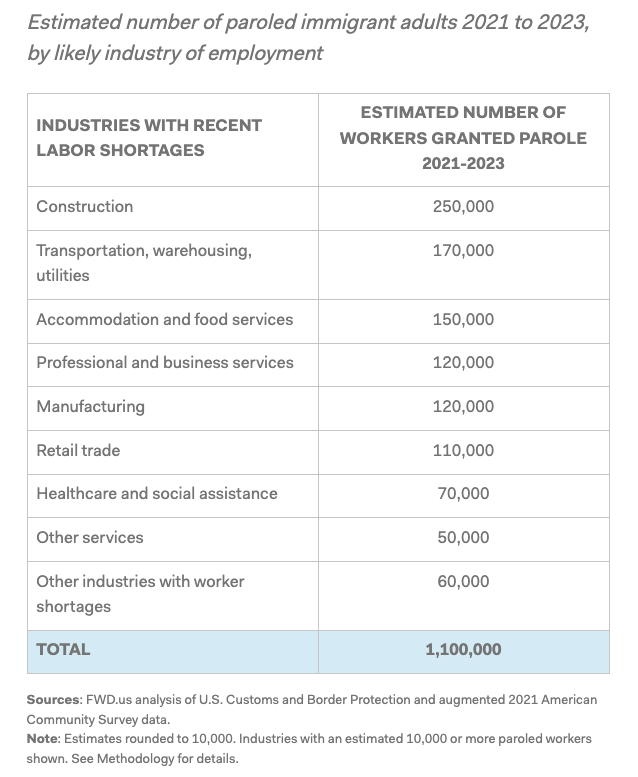President Joe Biden’s vast but legally doubtful “parole” migrant inflow is protected in the Senate’s draft border management deal, according to multiple reports.
Biden’s deputies pulled in roughly 1.1 million migrants via the parole side door in 2023. The bipartisan protections — negotiated by Sen. James Lankford (R-OK) — would be a big win for investors and CEOs because they will override four state-backed lawsuits that threaten to shut down the inflow.
In April 2023, the New York Times described Biden’s parole programs as a “New Back Door on Immigration.”
Biden’s paroled migrants are “A Golden Opportunity for Employers,” said a June 2022 report by the Connecticut Business & Industry Association. The report cited Dana Bucin, an immigration lawyer with Murtha Cullina LLP, who told local employers, “I have never seen something so simple … The world is your backyard for workforce solutions.”
Biden’s “Parole Sponsorship Is a Revolution in Immigration Policy,” the pro-migration Cato group claimed in September 2023.
RELATED VIDEO: Texas DPS Catches Teens Smuggling Five Illegal Immigrants, Stuffed in Pick-Up Truck:
The most important advocates for the parole programs are the West Coast investors behind FWD.us, which mounted a high-pressure lobbying campaign in January after media reports said the White House was considering concessions. Since then, the bipartisan Senate talks have been held up by the White House’s opposition to significant curbs on parole.
The FWD.us group was formed in 2013 by Mark Zuckerberg and other tech-sector billionaires to promote the doomed “Gang of Eight” bill that promised more labor and consumers to Wall Street investors. The investors gain stock values when the government extracts workers, renters, and consumers from poor countries for use in the United States.
The breadth of investors who helped fund FWD.us was hidden from casual visitors to the group’s website in early 2021, but copies exist at other sites.
A January 3 report by FWD.us claimed roughly one million blue-collar jobs have been filled by paroled migrants from Afghanistan, Ukraine, and Central and South America.
“Top occupational categories [for paroled migrants] include building and grounds maintenance (16% of those employed), retail sales (14%), food preparation and services (14%), transportation (13%), and construction (11%),” according to a second FWD.us report issued January 25.
Without the government-funded fix of cheap and compliant migrants, investors would be forced to recruit Americans at higher wages, invest in new workplace machinery, or launch more innovative, productive, and profitable businesses.
Filling Jobs
There is little media coverage of the parole migration into U.S. jobs, even though it allows employers to create many new low-productivity jobs that drag down Americans’ wages and wealth, and forces up government welfare spending.
In September 2023, the Wall Street Journal described how a New York restaurant battered by the coronavirus crash imported cheap labor via the “Uniting for Ukraine” parole program:
Two years ago, Veselka, a Ukrainian diner in Manhattan’s East Village renowned for its pierogi, was so short on cooks and wait staff that owner Jason Birchard was ready to cut the restaurant’s hours and end table service. Then last year, the war in Ukraine broke out. The Biden administration launched a program to sponsor Ukrainian refugees to live and work temporarily in the U.S.
Since then, Birchard has sponsored 10 Ukrainians, mostly extended family members of his existing employees, and eight now work at his restaurant. “One of my biggest challenges postpandemic was hiring. Not so anymore,” he said. “It’s been a win-win for me.”
Restaurant workers in New York earn roughly $17 an hour in New York, or $34,000 a year. That poverty-level income is not enough to pay for an apartment.
“[Nadia] Senkiv has been working as a full-time cook at a preschool in southeast Portland,” the Los Angeles Times reported in July 2023. “She also has a second job, putting in two hours at night clearing tables and washing dishes at a senior living center for $14.75 an hour.”
In December 2023, DocumentedNY.com described the fate of one Haitian parolee among the roughly 107,000 Haitians permitted to enter the United States:
Jemimah was a kindergarten teacher in Port-au-Prince. She dreamed of working in New York schools but couldn’t meet the requirements. She wanted to have a job so she could help her three siblings and her mother in Haiti. Now she wants to save money while in the U.S. to establish a school upon returning to Haiti. Eight months after arriving in New York, she works as a part-time babysitter.
The Associated Press described how North Dakota employers used the parole migration to reopen oil field jobs formerly held by well-paid migrant Americans. Ron Ness, who runs the North Dakota Petroleum Council’s Bakken Global Recruitment of Oilfield Workers, told the AP:
The Bakken program aims to recruit 100 workers by the end of 2023, and 400 after one year. Those 400 may not all be Ukrainians. Some will drive, start in shops or build roads, pads and fences, “everything from there up to well site operations.”
“[Pavlo] Savchyn was studying to work in the hotel and restaurant industry, while [Vadym] Prokopenko was about to finish training to become a plumber,” said a September 2023 article from Fargo, North Dakota, which continued:
Now both men are working in construction. They were eligible under the United States government’s Uniting for Ukraine program, which allows Ukrainians to stay in the U.S. for two years under humanitarian parole status.
…
Both men arrived in Fargo in late July, with not only jobs waiting for them, but also an apartment and transportation provided by their employer.
Roughly five million American men have fallen out of the workforce since 2000, partly because of drug addiction. U.S. productivity has grown slowly in contrast to China because U.S. companies can use imported cheap labor to grow profits instead of investing in workplace machinery.
Most of the parole migrants fill blue-collar jobs. However, the FWD.us report estimated that roughly 120,000 white-collar parolees filled jobs that would otherwise have gone to U.S. professionals. The Los Angeles Times cited one white-collar parolee:
Viktoriia Gorbachevska, 29, who quickly found work as a business analyst in Raleigh, N.C., since arriving from Ukraine in November after getting matched with a sponsor through Welcome Connect … she sees a lot of potential to build a future in the U.S.
Ordinary Americans Lose
American families lose out when employers can hire cheap foreign labor instead of hiring Americans or investing in productivity.
For example, the Ukrainians in the Bakken oil fields are being used to replace better-paid Americans who migrated to the Bakken oil discovery for boom-town jobs during the 2010s. The boom exploded wages even for fast-food workers beyond the $7.25 minimum. “Our starting wage out there is $11, and that’s just to start,” Hardee’s manager Jon Munger told CNBC in 2014. “We’ve got people at $13, $14, $15 at the crew level,” he said.
Americans “came by planes, trains and automobiles, every way possible from everywhere for the opportunity for work … They were upside down on their mortgage, their life or whatever, and they could reset in North Dakota,” said Ness, who is importing the cheaper, less-mobile Ukrainian migrants.
But the greatest economic damage is done to Americans at the lower end of the economic scale, including people who never graduated from high school, are addicted, or are ex-convicts.
“Navigating life after prison can be tough, especially when job hunting,” NorthernExpress.com reported in May 2023:
“Typically they get very little support,” says Jessica Willis of those who have a criminal background. Willis is the chief program officer at Networks Northwest, which oversees the program in this area. “We work with employers and help to place them.”
Willis says some prospective employers believe that such individuals are not trustworthy, have no work ethic, and are not safe. “That’s a risk you take with anyone,” she says.
The parole programs are illegal, according to four lawsuits. The suits say that Biden’s parole releases violate the 1996 update to the parole law that says parole must only be given on a case-by-case basis for “urgent humanitarian reasons” or “significant public benefit.”
“The parole statute does not permit what [Biden’s agency] is doing,” Matt Crapo, senior counsel at the Immigration Reform Law Institute, told Breitbart News.
RELATED VIDEO — Official: We’re Considering Expanding Asylum Opportunities to Deal with Influx of Venezuelan Migrants:
If Lankford’s deal becomes law, it is expected to legalize Biden’s parole inflow.
But there is much support among Democrats for the parole giveaway. For example, Democrats asked Biden’s deputies to speed the award of work permits to paroled migrants.
Some Republican politicians also back the parole migration. Bloomberg reported in December 2023:
Republicans like Utah Gov. Spencer Cox and Indiana Gov. Eric Holcomb, whose states nearly matched previous low unemployment rates, have backed the concept along with scores of business leaders who have joined a campaign to have the administration expand parole options to long-term residents of the US without legal status.
“There’s a lot of restaurants that need three busboys but they’ve only got one because there’s not enough people,” said Sam Toia, CEO of the Illinois Restaurant Association. “We could address a lot of these issues if we got undocumented immigrants working permits.”
Business-backed advocates — such as FWD.us — want even more labor migration. For example, the New York Times posted a January op-ed by Cato saying more parole migrants can reduce visible chaos at the border. “Expanding these procedures into other major origin countries and letting more people enter legally will reduce the flows to more manageable levels,” according to the report.
Overseas Damage
Advocates for the parole programs are silent about the damage done to the countries that lose workers to the parole programs.
For example, the parole program is also extracting white-collar dissidents from the grateful autocracies in Cuba, Venezuela, and Nicaragua that profit from the export of young rebels and the online return of their remittances. The Associated Press reported:
Political journalist Marcelo Conde fled Nicaragua last year after he received death threats because he was not in favor of President Daniel Ortega … After he finally arrived in the U.S., he received an authorization to work. In Nevada, he is waiting tables. Conde speaks Spanish, French and English and hopes soon to work as a journalist in the U.S.
In Haiti, crime is rising as many Haitian police use the parole program to emigrate to the United States. The Miami Herald reported comments from Marleine Bastien, a commissioner in Florida’s Miami-Dade County:
A critic of the humanitarian parole program, Bastien, who runs the Family Action Network Movement in Miami, notes that the hastily put together humanitarian parole program is draining Haiti of the professionals and young people the country needs, as an average of 5,000 people leave each month.
Embattled Ukraine is also short of soldiers, and is appealing to Canada and to European governments to send Ukrainians back home to operate the expensive weaponry granted by Europe and the United States.
But Biden’s invitation changes the incentives for foreigners who might otherwise stay at home to help develop their countries. For example, The CBIA report included an email from an older Ukrainian couple:
We, a family from Ukraine, are looking for a sponsor to move to the USA under the Uniting for Ukraine program.
I am 55 years old and I practice law. My wife is 56 and also a lawyer.
We need help in moving to the United States of America, where we can start a new life and integrate into society as soon as possible.
Due to certain health problems, a warm climate near the ocean suits us.


COMMENTS
Please let us know if you're having issues with commenting.